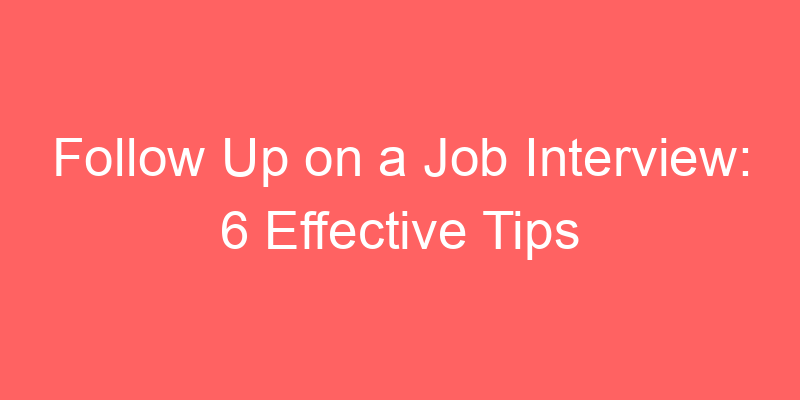How to Follow Up on a Job Interview
Why Follow-Up Matters?
Following up after a job interview can significantly impact your chances of landing the position you desire. It demonstrates your enthusiasm, professionalism, and attention to detail, qualities that employers value highly. By taking the initiative to follow up, you stay fresh in the interviewer’s mind and showcase your commitment to the role.
Best Practices for Following Up
Effective follow-up strategies involve a delicate balance of persistence and respect for the interviewer’s time. Here are key tips to guide you:
- Timely Communication: Send a thank-you email within 24 hours of the interview. Express gratitude for the opportunity and reaffirm your interest in the position.
- Personalization: Reference specific points from the interview to personalize your message. This shows attentiveness and reinforces your fit for the role.
- Polite Persistence: If you don’t hear back within a week after the interview, follow up with a brief, courteous email. Reiterate your interest and inquire about the next steps in the hiring process.
- Respect Boundaries: Avoid excessive follow-ups that may come across as pushy or desperate. Respect the timeline provided by the interviewer.
Sample Follow-Up Email Template
Here’s a sample template you can use to craft your follow-up email:
Subject: Thank You – [Job Title] Interview
Dear [Interviewer’s Name],
Thank you for taking the time to meet with me yesterday. I enjoyed learning more about the [Company Name] team and the opportunity to contribute as [Job Title]. I am enthusiastic about the possibility of joining your team and contributing to [specific project/initiative discussed, if any].
I am eager to hear about the next steps in the hiring process. Please feel free to reach out if you need any further information from my side.
Best regards,
[Your Full Name]
[Your Contact Information]
Importance of Professional Development
Continuously improving your skills and knowledge can enhance your employability. Consider taking relevant courses or workshops to stay competitive in your field. Online platforms like LinkedIn Learning and Coursera offer a wide range of courses that can boost your resume and help you stand out to potential employers.
Conclusion
Following up on a job interview is more than just a formality; it’s an opportunity to reaffirm your interest and showcase your professionalism. By crafting thoughtful follow-up communications and staying engaged in your professional development, you increase your chances of turning an interview into a job offer.
How to Follow Up on a Job Interview
Why Follow-Up Matters in Job Interviews
Following up after a job interview can significantly impact your chances of landing the position. It demonstrates your enthusiasm and commitment to the role, keeping you fresh in the interviewer’s mind amidst other candidates.
Best Practices for Effective Follow-Up
1. Timing is Key: Send a thank-you email within 24 hours of the interview, expressing gratitude for the opportunity.
2. Personalize Your Message: Reference specific points discussed during the interview to show your attentiveness.
3. Reiterate Interest: Clearly state your continued interest in the position and the company’s mission.
4. Stay Professional: Maintain a polite and professional tone throughout your communication.
Following Up via Email
Sending a follow-up email is the most common and effective method to reiterate your interest and keep yourself top-of-mind. Here’s a sample template:
Subject: Thank You for the Opportunity Dear [Interviewer's Name], I hope this message finds you well. I wanted to extend my sincere gratitude for the opportunity to interview for the [Job Title] position at [Company Name]. It was a pleasure discussing how my skills in [Your Skills] align with the goals of your team, particularly when we talked about [Specific Discussion Point]. I am enthusiastic about the possibility of contributing to [Company Name] and am eager to hear any updates regarding the next steps in the hiring process. Please do not hesitate to reach out if there is any additional information I can provide. Thank you once again for your time and consideration. Best regards, [Your Full Name] [Your Contact Information]
Career Advice and Tips
Following up effectively is not just about courtesy; it’s a strategic move that showcases your professionalism and proactive approach. Employers appreciate candidates who take initiative, which can set you apart in a competitive job market.
Resume FAQs
Q: Should I follow up if I haven’t heard back after sending a thank-you email?
A: Yes, it’s advisable to follow up after a week or two if you haven’t received any response. It shows your continued interest and keeps you in the hiring manager’s consideration.
Career Path Visualization
| Entry-Level | Mid-Level | Senior-Level | Executive-Level |
|---|---|---|---|
| Junior Analyst | Senior Analyst | Department Manager | Chief Operating Officer |
| Junior Developer | Lead Developer | Chief Technology Officer | Chief Executive Officer |
Resume Strategies
When following up on an interview, consider including a brief mention of your key strengths and how they align with the job requirements. This reinforces your suitability for the role and keeps your application memorable.
Resume Checklist
- Did you personalize your thank-you message?
- Have you proofread your email for any typos or grammatical errors?
- Did you mention specific points discussed during the interview?
- Have you included your contact information for easy reference?
Conclusion
Following up on a job interview is not just a formality; it’s an opportunity to reaffirm your interest and make a lasting impression. By following these strategies and tips, you can navigate the post-interview process with confidence and professionalism.
`
Generate Your NEXT Resume with AI
Accelerate your resume crafting with the AI Resume Builder. Create personalized resume summaries in seconds.




